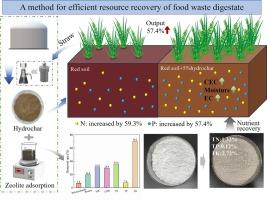Efficient resource recovery from food waste digestate via hydrothermal treatment and its application as organic fertilizer
IF 9.7
1区 环境科学与生态学
Q1 AGRICULTURAL ENGINEERING
引用次数: 0
Abstract
With the continuous recognition of green, organic and non-polluting products, organic fertilizers play an increasingly vital role in agricultural production. Among them, hydrochar-based organic fertilizer has attracted widespread attention recently. The present study evaluated the potential of digestate from anaerobic digestion of food waste for the preparation of hydrochar-based organic fertilizer by straw-based, FeCl3-catalyzed hydrothermal carbonization (HTC). Under the optimal conditions, a hydrochar-based organic fertilizer with > 25 wt% humus content and limited pollution risk was successfully prepared. The pot experiment demonstrated the feasibility of improving the physicochemical properties of red soil and promoting crop growth after adding hydrochar in place of commercial fertilizer. In addition, the function of zeolite on nutrient recovery in hydrothermal liquid (HTL) was analyzed, and preparing the slow-release organic fertilizer by mixing the nutrient-rich zeolite with hydrochar in a mass ratio of 1:4 was proposed. This work has significant implications for achieving the efficient resource recovery of digestate.

通过水热处理从厨余沼渣中高效回收资源并将其用作有机肥料。
随着人们对绿色、有机和无污染产品的不断认可,有机肥料在农业生产中发挥着越来越重要的作用。其中,以水碳为基础的有机肥料近来引起了广泛关注。本研究评估了食物垃圾厌氧消化产生的沼渣通过秸秆、FeCl3 催化水热碳化(HTC)制备水炭基有机肥的潜力。在最佳条件下,成功制备出腐殖质含量大于 25 wt%、污染风险有限的水炭基有机肥。盆栽实验证明了添加水炭素替代商品肥料后改善红壤理化性质和促进作物生长的可行性。此外,还分析了沸石对水热液(HTL)中养分回收的作用,并提出了将富含养分的沸石与水炭按 1:4 的质量比混合制备缓释有机肥的建议。这项工作对实现沼渣的高效资源回收具有重要意义。
本文章由计算机程序翻译,如有差异,请以英文原文为准。
求助全文
约1分钟内获得全文
求助全文
来源期刊

Bioresource Technology
工程技术-能源与燃料
CiteScore
20.80
自引率
19.30%
发文量
2013
审稿时长
12 days
期刊介绍:
Bioresource Technology publishes original articles, review articles, case studies, and short communications covering the fundamentals, applications, and management of bioresource technology. The journal seeks to advance and disseminate knowledge across various areas related to biomass, biological waste treatment, bioenergy, biotransformations, bioresource systems analysis, and associated conversion or production technologies.
Topics include:
• Biofuels: liquid and gaseous biofuels production, modeling and economics
• Bioprocesses and bioproducts: biocatalysis and fermentations
• Biomass and feedstocks utilization: bioconversion of agro-industrial residues
• Environmental protection: biological waste treatment
• Thermochemical conversion of biomass: combustion, pyrolysis, gasification, catalysis.
 求助内容:
求助内容: 应助结果提醒方式:
应助结果提醒方式:


